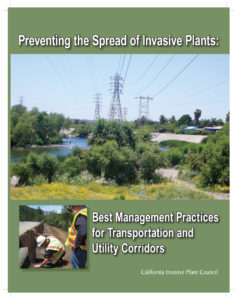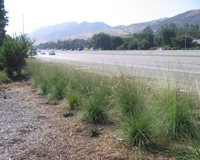 Transportation and utility corridors are at-risk sites for the introduction and spread of noxious and invasive plants. Corridor managers and staff can greatly reduce the introduction and spread of invasive plants by incorporating prevention measures into their daily management activities.
Transportation and utility corridors are at-risk sites for the introduction and spread of noxious and invasive plants. Corridor managers and staff can greatly reduce the introduction and spread of invasive plants by incorporating prevention measures into their daily management activities.
Additionally, implementing prevention BMPs in corridor management can reduce maintenance needs and cost, reduce erosion and fire hazards, limit liability for the governing agency, improve appearance, maintain good public relations, and provide wildlife habitat. This manual presents an accessible overview of key prevention measures as well as ready-to-use checklists.
Preventing the Spread of Invasive Plants: Best Management Practices for Transportation and Utility Corridors
This manual is available as a free download. Click here for a PDF of BMPs for Transportation and Utility Corridors. (70 pp., 48 MB)
- Contents:

Planting desirable vegetation along roadsides can prevent invasive plants from establishing. Photo courtesy Jack Broadbent, Caltrans
- Prioritizing BMP Implementation
- Pre-Activity Assessment Outline
- Ch. 1. General BMPs
- Ch. 2. Planning BMPs
- Ch. 3. Materials Management BMPs
- Ch. 4. Vegetation Management BMPs
- Ch. 5. Soil Disturbance BMPs
- Ch. 6. Revegetation and Landscaping BMPs
- Ch. 7. Routine Maintenance and Facility Inspection BMPs
- Checklist A: Routine Maintenance – Facility Inspection and Maintenance
- Checklist B: Routine Maintenance – Vegetation Management
- Checklist C: New Projects – By Activity
- Checklist D: New Projects – By Phase
- Checklist E: Inspection and Cleaning
- Resources for Additional Information
Acknowledgements
This manual would not have been possible without the expert knowledge generously provided by technical team members across the state.
Funding was provided by the California Department of Food and Agriculture and USDA Forest Service, State and Private Forestry (American Recovery and Reinvestment Act funds).
Civil Rights
In accordance with Federal law and U.S. Department of Agriculture policy, Cal-IPC is prohibited from discrimination on the basis of race, color, national origin, sex, age or disability. (Not all prohibited bases apply to all programs.) To file a complaint of discrimination, write USDA, Director, Office of Civil Rights, Room 326-W, Whitten Building, 1400 Independence Avenue, SW, Washington DC 20250-9410 or call (202) 720-5964 (voice and TDD). USDA is an equal opportunity provider and employer.
Please cite this report as: Cal-IPC. 2012. Preventing the Spread of Invasive Plants: Best Management Practices For Transportation and Utility Corridors. Cal-IPC Publication 2012-1. California Invasive Plant Council, Berkeley, CA. Available at www.cal-ipc.org
For more information, contact Cal-IPC.
